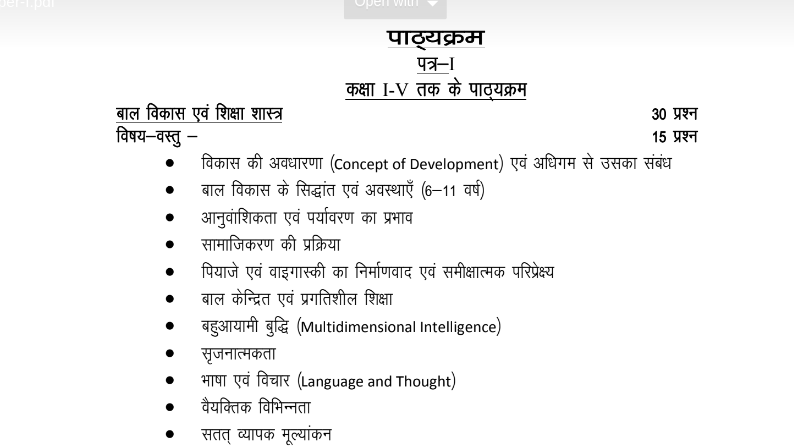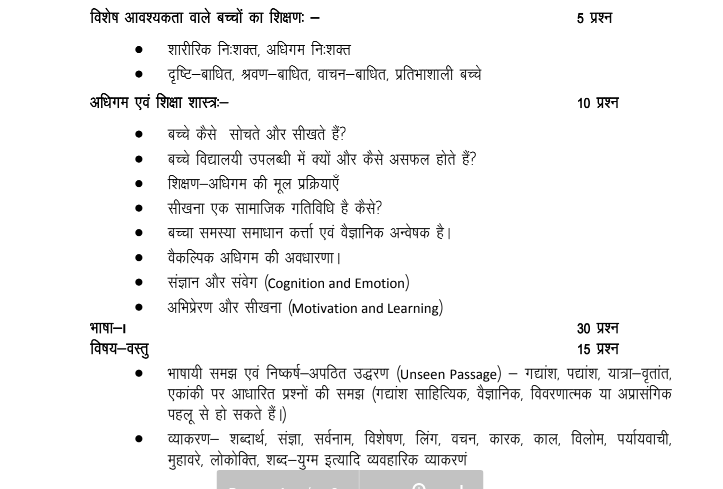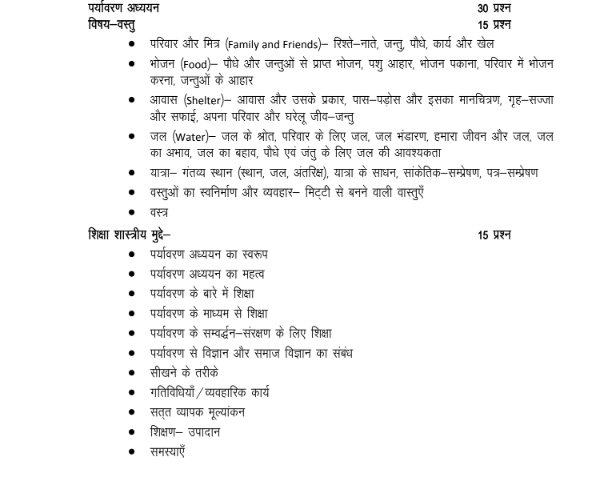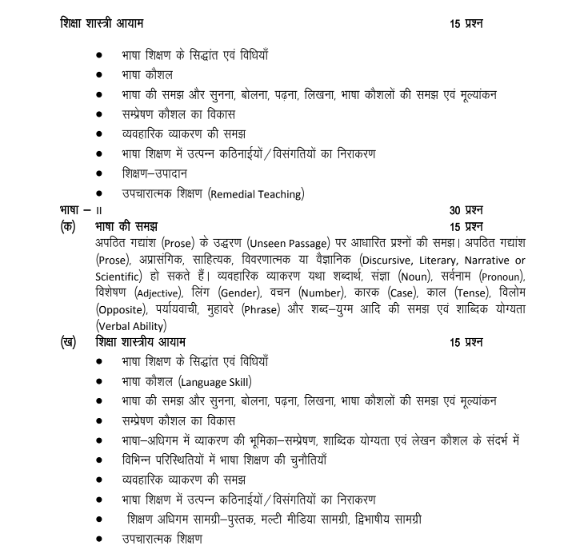Bihar TET Syllabus 2025
Bihar TET Syllabus: Those candidates who want to appear in BTET Examination, may check the Bihar TET Syllabus of the examination. The BTET Syllabus would be as per last year's information brochure. In case if there will be any changes in BTET Exam 2025 notification, they will be updated here. BTET Exam Pattern, Paper Pattern, and Marking Scheme The State Teachers Eligibility Test (STET) is conducted for each state separately to shortlist candidates in the position of primary and secondary school teachers in different primary and secondary aided and unaided government schools of the state.

The Bihar TET Examination Department (BSEB) has uploaded the Bihar TET Syllabus in PDF format in Hindi. In this article, we are providing the completed BTET Syllabus 2025 (Paper-I and Paper-II). Eligible and Interested Candidates check and download all Subject Bihar Teacher Eligibility Test Syllabus in PDF format from its official website.
Bihar TET Exam Syllabus:
BTET Syllabus: The exam is organized by the State Boards of Secondary Education of the particular state in which the appointments have to be made. The exam is held every year in the months of June/ July respectively for all the states. Given below are the details of the exam including the paper pattern and selection process for all the interested candidates to go through.
|
| BTET Exam Notification |
| BTET Registration Form |
| BTET Exam Pattern |
| BTET Admit Card |
| BTET Exam Date |
| BTET Answer Key |
| BTET Result |
Bihar TET Syllabus 2025 - BTET Syllabus
The Bihar School Examination Board (BSEB) is going to conduct the Bihar TET Exam in June 2025. Candidates who are appearing in the Bihar TET Exam should be aware of the Bihar TET Syllabus 2025. The Bihar School Examination Board (BSEB) has uploaded the Bihar TET Exam Syllabus on its official website. Applicants can access the Bihar TET Syllabus Subject- Wise from its official website i.e bihartet.co.in. for both the papers (I &II).
The Bihar TET Syllabus 2025 will help the candidates to know their subjects and subject's topic paper-wise. Candidates can use the Bihar (BTET) TET Syllabus to make a perfect preparation plan.
BTET Paper 1 & 2 Syllabus:
Paper-I:
- Child development and Pedagogy
- Language I (Hindi / English/ Urdu/ Bangla/ Maithili)
- Language II (Hindi / Urdu/ Bangla / English/ Maithili)
- Mathematics
- Environmental Sciences
Paper-II:
- Child development and Pedagogy
- Language I (Anyone of Hindi / Urdu / Bangla / Maithili / Bhojpuri / Sanskrit / Arabic / Persian / English)
- Language II (Anyone of Hindi / Urdu / Bangla / Maithili / Bhojpuri / Sanskrit / Arabic / Persian / English)
- Mathematics and science or sociology
Child Development And Pedagogy |
Language I |
Language II |
Mathematics |
Science |
Social Studies/Social Sciences |
|
Concept of development and its relationship with learning |
Remedial Teaching |
Pedagogy of Language Development 15 Questions |
Number System |
Food |
History |
|
Principles of the development of children |
Language Skills |
Learning and acquisition |
Knowing our Numbers |
Source of Food |
When, Where and How |
|
influence of Heredity & Environment |
Role of listening and speaking |
Principles of language Teaching |
Playing with Numbers |
Components of Food |
The Earliest Societies |
|
Socialization processes:
|
Principles of language Teaching |
For communicating ideas, A critical perspective on the role of grammar in learning the language |
Whole Numbers |
Cleaning Food |
The First Farmers and Herders |
|
Concepts of child-centred and progressive education |
Learning and acquisition |
verbally and in written form |
Negative numbers and integers |
Materials of daily use |
The First Cities |
|
Critical perspective of the construct of Intelligence |
Pedagogy of Language Development |
Challenges of teaching a language in a diversified classroom; language difficulties, errors, and disorders. |
Fractions |
Materials |
Early States |
|
Multi-Dimensional Intelligence |
Language Comprehension |
Language Skills |
Algebra |
The World of the Living |
Political Developments |
|
Language & Thought |
Evaluating language comprehension and proficiency:
|
Introduction to Algebra |
Moving Things People and Ideas |
Culture and Science |
|
|
To address the needs of the children with learning difficulties, and impairment, etc |
Teaching and learning materials:
|
Ratio and Proportion |
Electric Current and circuits |
New Kings and Kingdoms |
|
|
Addressing the Talented, Creative, Specially abled Learners |
Remedial Teaching |
Geometry |
Magnets |
The sultans of Delhi |
|
|
Basic geometrical ideas (2-D) |
Natural Phenomena |
Architecture |
||
|
A Child as a ‘scientific investigator’ and a problem solver |
Understanding Elementary Shapes (2D-3D) |
Natural Resources |
Creation of an Empire |
||
|
Cognition & Emotions |
Symmetry: (reflection) |
Social Change |
|||
|
Motivation and learning |
Construction (using Straight edge Scale, protractors, compasses) |
Regional Cultures |
|||
|
Factors contributing to learning – personal & environmental |
Mensuration |
Geography |
|||
|
Data Handling |
Planet: Earth in the solar system |
||||
|
Globe |
|||||
|
Environment in its totality: natural and human environment |
|||||
|
Human Environment: settlement, transport, and communication |
|||||
|
Air and Water |
|||||
|
Resources: Types-Natural and Human |
|||||
|
Social and Political Life |
|||||
|
Diversity |
|||||
|
Government |
|||||
|
Local Government |
|||||
|
Making a Living |
|||||
|
Democracy |
|||||
|
State Government |
|||||
|
Understanding Media |
|||||
|
Unpacking Gender |
|||||
|
The Constitution |
|||||
|
Parliamentary Government |
|||||
|
The Judiciary |
|||||
|
Social Justice and the Marginalised |
Distribution of the Marks for Paper- 1 and 2
The marks distribution for Bihar TET Syllabus paper-1 and paper-2 is given below in table format
Section |
Marks |
|
निर्दिष्ट विषय वस्तु |
100 Marks |
|
शिक्षण कला एवं अन्य दक्षता |
50 Marks |
Bihar Teacher Eligibility Test: Selection Process:
The Bihar TET Recruitment 2025 selection process will be based on:-
- Written Exam
- Physical Fitness Test
Check Bihar TET Syllabus

In Child development:
Bihar TET Syllabus for Pedagogy and Child Development :
1. Inclusive Education concept and to understand the special needs of children: Addressing disadvantaged & deprived learners from various backgrounds
2. Addressing the Talented
3. Creative
4. Especially able Learners
5. Addressing children needs with their difficulties in learning
6. Learning & Pedagogy: to understand children learning and thinking process; how & why children ‘fail’ to accomplish success in their performance at school
7. Basic processes of teaching and learning
8. Children’s strategies of learning; learning as a social activity
9. Learning social context
10. Other concepts of learning in children
11. Understanding children’s ‘errors’ as significant steps in the learning process
12. Cognition and Emotions
13. Motivation & learning
14. Contributing Factors to learning: personal and environmental
15. Child Development related to primary school

Bihar TET Syllabus for Environmental Studies:

1. Practical Work Basic Primary and Elementary level EVS fundamentals
2. Pedagogical Issues: EVS Concept & scope
3. Environmental Education & Environmental Studies
4. Presenting concepts Approaches
5. Importance of Environmental Studies and Integrated Environmental Studies
6. Learning Principles
7. Activities
8. Scope & relation to Science & Social Science Material of Teaching
9. Aids
10. Experimentation

BTET Syllabus for Language I & Language II:
1. Acquisition and Learning in language development pedagogy
2. Listening roles and speaking
3. Principles of languages and Teaching
4. Critical aspects of grammar
5. Remedial Teachings
6. Teaching challenges in the classroom to evaluate proficiency in language comprehension
7. The material of teaching in learning
8. Language Skills
9. Language Comprehension: Reading unseen passages
10. Verbal abilities
11. Grammar
12. Inference
BTET Mathematics Syllabus:
1. Geometry: Shapes and their local understanding
2. Numbers: numbers and operations
3. Currency: Money resolve problem
4. Measurement: Length, Mass, Weight, Volume Time
5. Game of statistics
6. Mental math pattern
7. Nature and nature of mathematics
8. Importance of maths teaching
9. Methods of mathematics teaching
10. Math’s language
11. Mathematical location in the curriculum
12. Teaching problems in math
13. Diagnostic and therapeutic teaching and assessment
14. Analysis of errors
15. Learning-related dimensions
Trending Searches in Exams
Copyright @2024.www.collegedisha.com. All rights reserved

